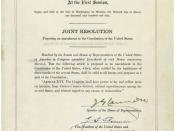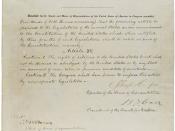2
Due Process
1
Due Process
Due Process Clause:
Types and advantages of it.
Gerta Agalliu
Criminal Justice 201
Professor Casey
September 21, 2014
According to Black's Law Dictionary: Due Process of Law implies the right of the person affected thereby to be present before the tribunal which pronounces judgment upon the question of life, liberty, or property, in its most comprehensive sense; to be heard, by testimony or otherwise and to have the right of controverting, by proof, every material fact which bears on the question of right in the matter involved." (Black's Law Dictionary, 1999) Due process is a very complex subject to try to explain but in a few words simply means that it holds the government subservient to the land of the law and that people have the protection against a chance deprivation of life, liberty or property. In this essay I will write about the origins of due process, the different types of due process and the advantages of having that kind of law in our constitution.
Due process is originated from the Magna Carta (1215), which was the Great Chapter of English liberties where the nobles limited the King's authority. John, King of England promised: "No free man shall be seized or imprisoned, or stripped of his rights or possessions, or outlawed, or exiled, or deprived of his standing in any other wayâ¦except by the lawful judgment of his equals or by the law of the land". The phrase "law of the land" then transformed over time to what is now known as "due process of law."(Sargentich, 2009).The phrase the "law of the land" was also part of Massachutes statute in 1692. In addition, the f ifth and f ourteenth amendments to the United States Constitution each contain a Clause. The Fifth Amendment states...


